Article on this event on the official website of G20 Brazil 2024: https://www.g20.org/pt-br/noticias/acontece-hoje-o-encontro-preparatorio-da-cupula-social-do-g20-no-rio-de-janeiro
Official video summarizing the event:
Table of Contents
Introduction
Invitation
We were invited to participate in a significant event of the “G20 Social” organized by Brazil. This event took place on 08/20/2024 in Rio de Janeiro, a city chosen as the Capital of G20 2024 (https://g20.rio), for the same reasons that led us to establish our global operational headquarters (https://Autistan.rio) here in this same city in 2017.
Presentation of G20 Social
The “G20 Social” is a concept introduced by Brazil to highlight social, economic, and environmental aspects in G20 discussions, complementing traditional debates focused on economic growth and financial stability. This concept aims to expand the scope of G20 discussions to include themes related to social development, reducing inequalities, social inclusion, improving living conditions, and sustainable development.
Objectives and Themes of G20 Social
-
-
Social Inclusion: Promoting policies that encourage the inclusion of marginalized groups, including disabled people, ethnic minorities, and women, to create fairer and more equitable societies.
-
Reducing Inequalities: Addressing income and wealth inequalities on a global scale, developing strategies to reduce disparities between different social groups.
-
Sustainable Development: Integrating the Sustainable Development Goals (SDGs) into G20 discussions, emphasizing the need to balance economic growth with environmental preservation and social well-being.
-
Social Protection Policies: Encouraging the development and strengthening of social protection systems, such as universal healthcare, retirement pensions, and poverty alleviation programs, to ensure economic and social security for all.
-
Education and Training: Promoting education and training initiatives that better prepare workers for the jobs of the future, particularly in the context of digital transition and automation.
-
Impact and Importance of G20 Social
By introducing the concept of “G20 Social,” Brazil seeks to expand the role of the G20 beyond strictly economic issues to address global social challenges. This reflects an understanding that economic development cannot be sustainable without social and inclusive progress. By making “G20 Social” a central theme, Brazil encourages G20 members to adopt a more holistic approach to global development, recognizing the interdependence of economic, social, and environmental dimensions.
The “G20 Social” also makes it possible to include the perspectives and experiences of emerging countries, often facing development challenges different from those of developed economies, thereby contributing to a more balanced and representative dialogue at the international level.
In summary, the “G20 Social” is an initiative aimed at enriching G20 discussions with a focus on social development, inclusion, and sustainability, encouraging an integrated approach to global economic policies.
Day Program
 Loading...
Loading...
Morning
Start
The event took place at Fundição Progresso.
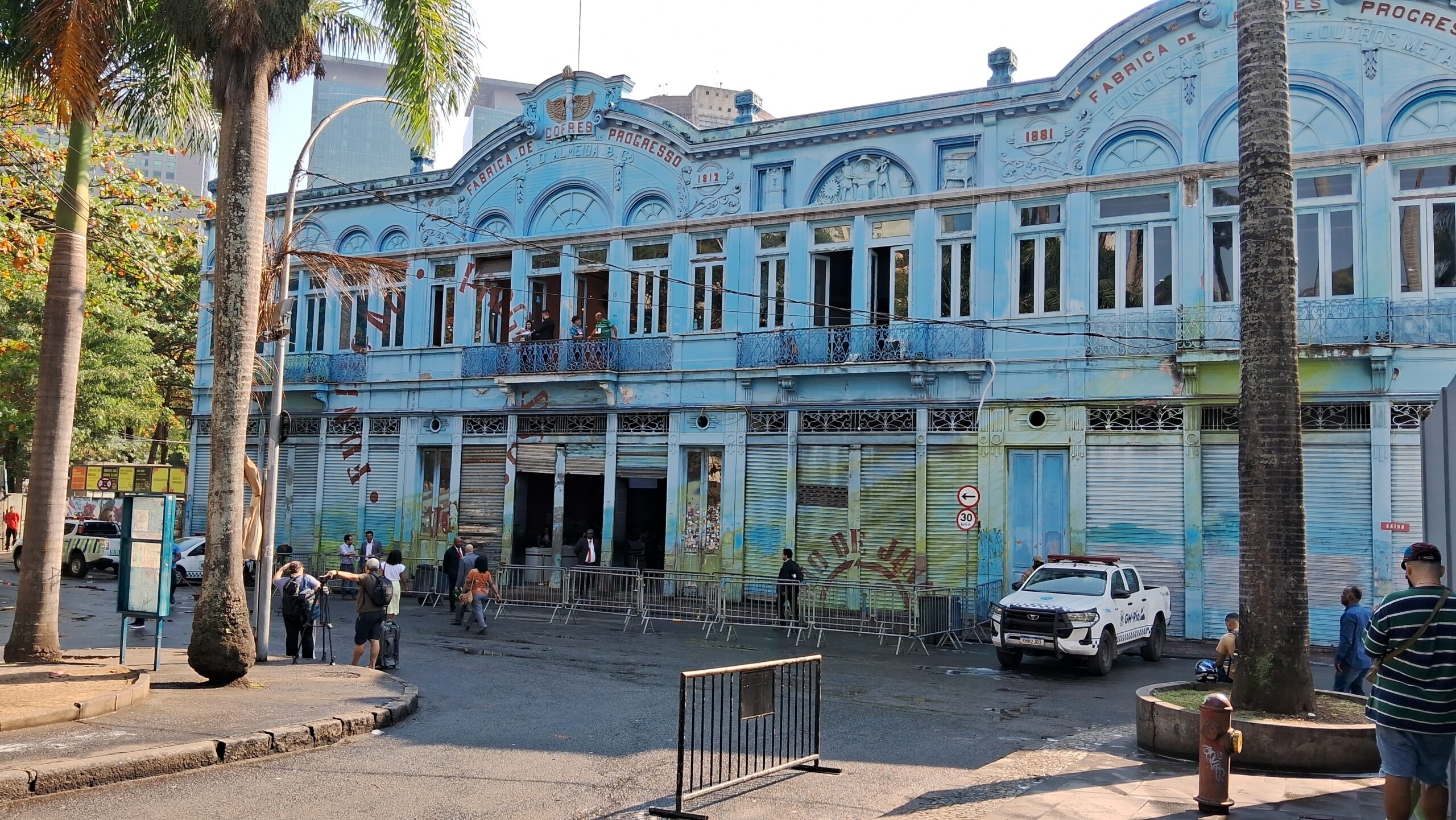
Arrival at Fundição Progresso
Fundição Progresso is an iconic cultural center located in the Lapa district of Rio de Janeiro, Brazil. Housed in a former foundry, this multifunctional space has become an important gathering place for the city’s culture and arts.
Fundição Progresso is much more than just a cultural center; it is a symbol of Brazilian diversity and creativity. It embodies the vibrant spirit of Rio de Janeiro as a city rich in culture and history, also serving as a platform for artistic expression and community engagement.
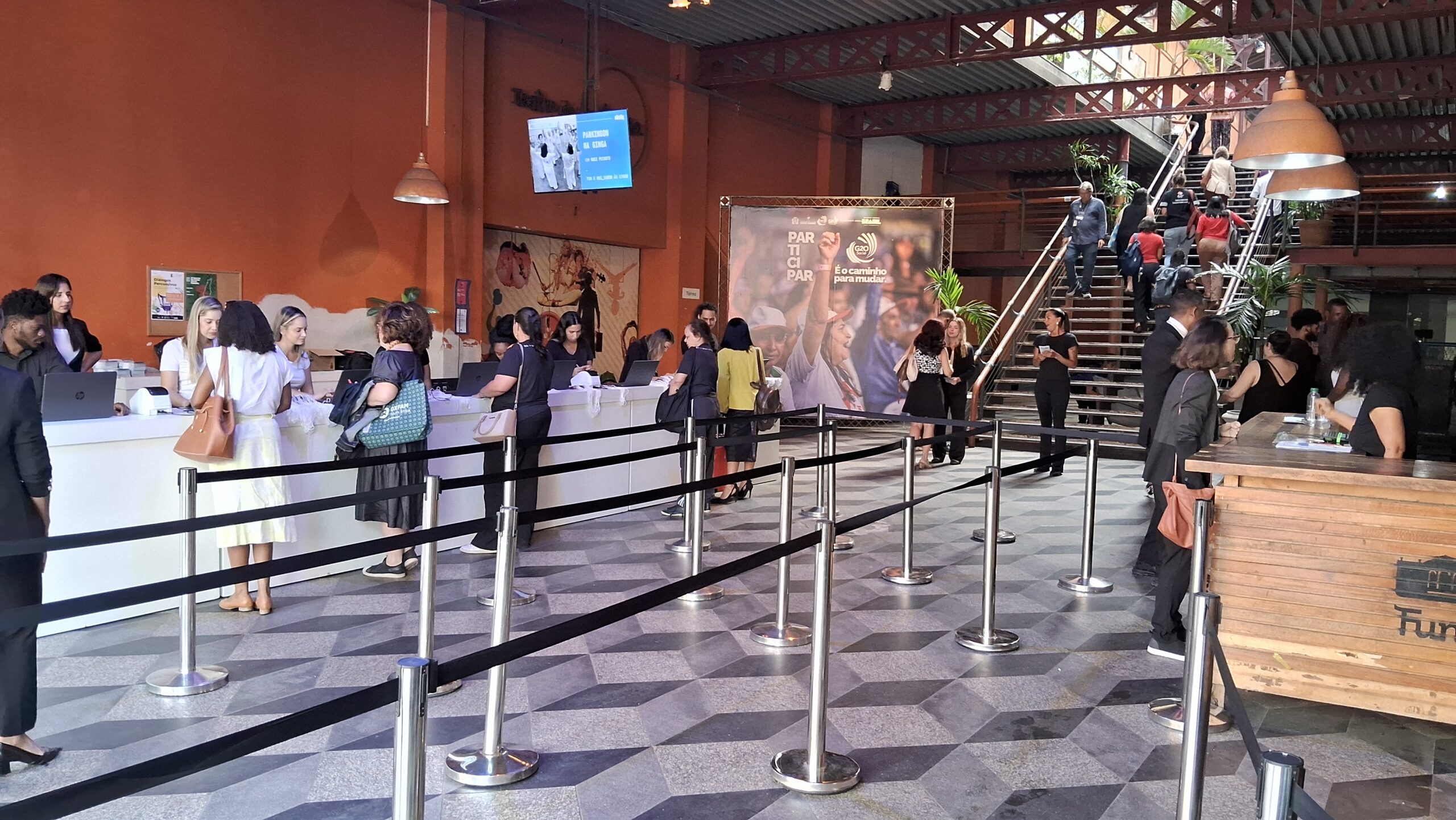
Brochure given to each participant at the entrance:
 Loading...
Loading...
Brazilian National Anthem
We had the great privilege of hearing the Brazilian National Anthem, sung standing by the participants. It is undeniably a beautiful song, enhanced by stunning video images. The lyrics truly reflect the spirit of the Brazilian people, and their enthusiasm was palpable. It was a very moving moment.
Lyrics of the full version of the Brazilian National Anthem
Full Video of the Speeches
Here is the official (governmental) video of all the morning speeches:
Minister Márcio Macêdo
Here is our video recording of the speech by the Minister of the General Secretariat of the Presidency of the Republic and coordinator of the G20 Social, Márcio Macêdo
At the end of the speeches by the dignitaries, with Minister Márcio Macêdo concluding the series, we handed him our contact card and a summary presentation page.
G20 Social Participatory Application
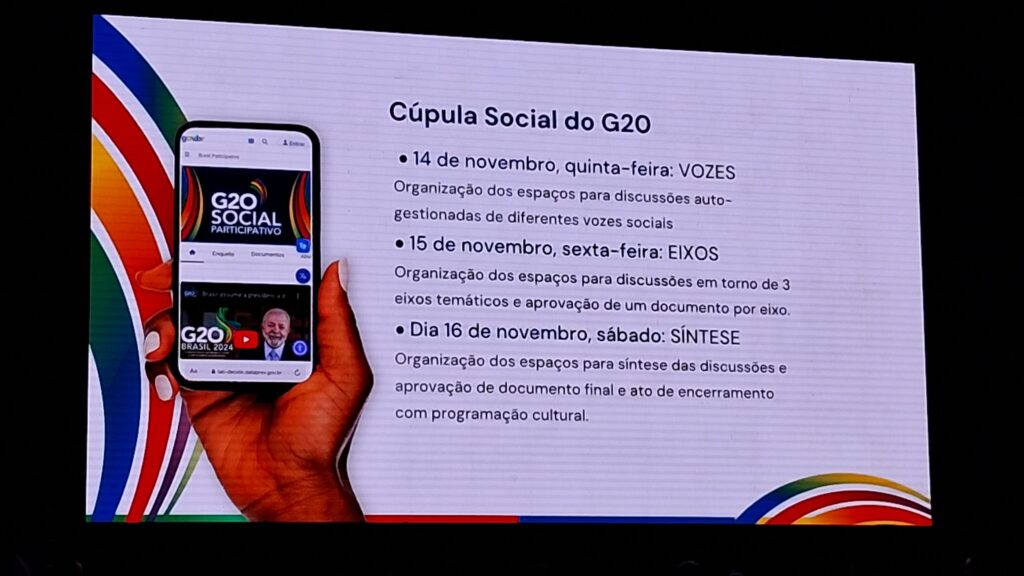
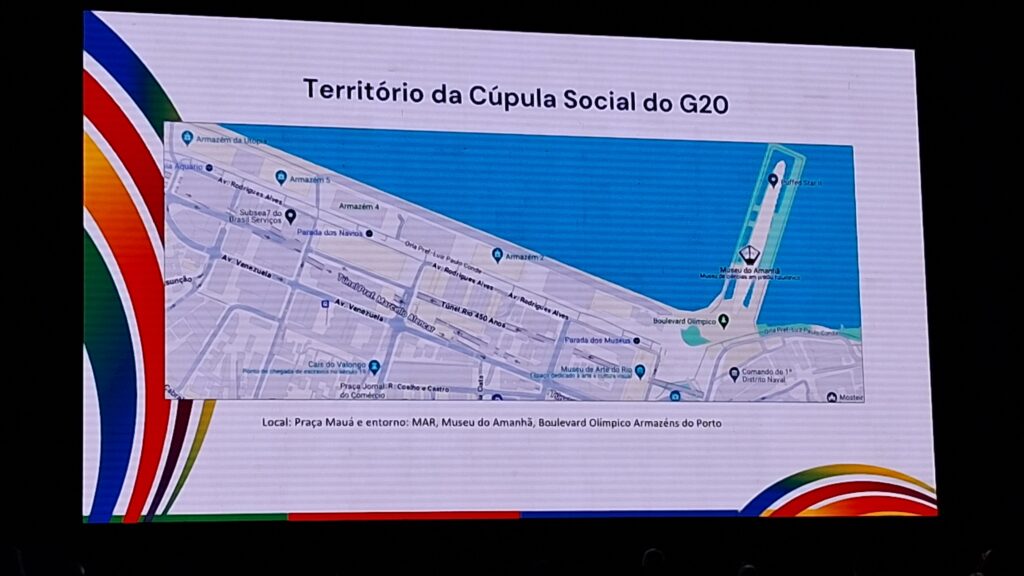
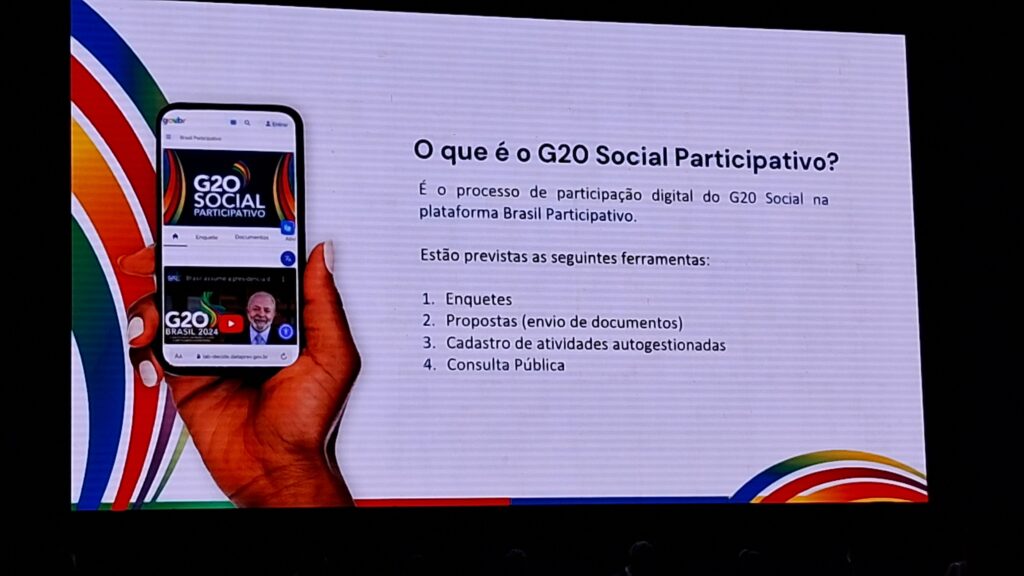
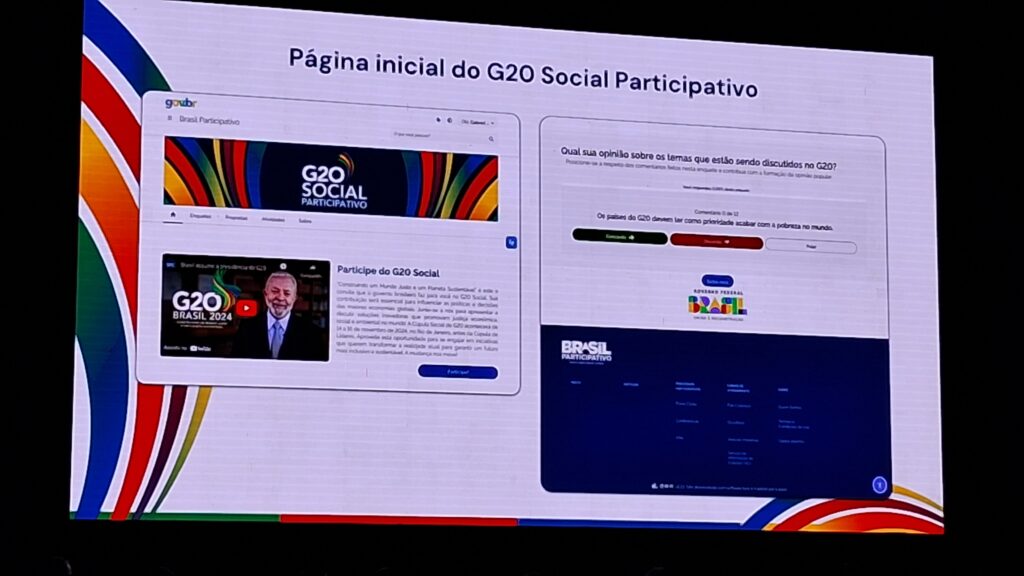
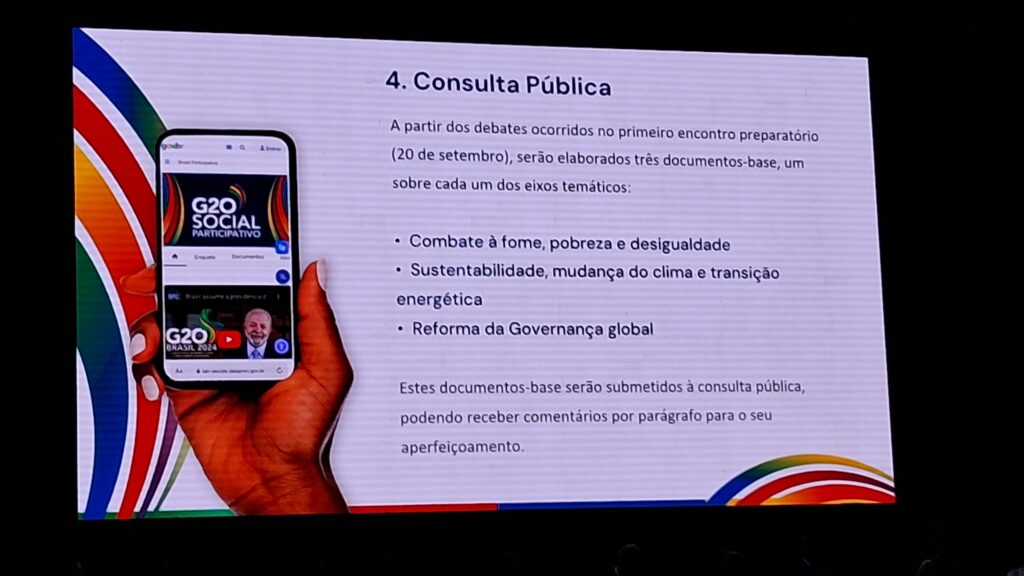
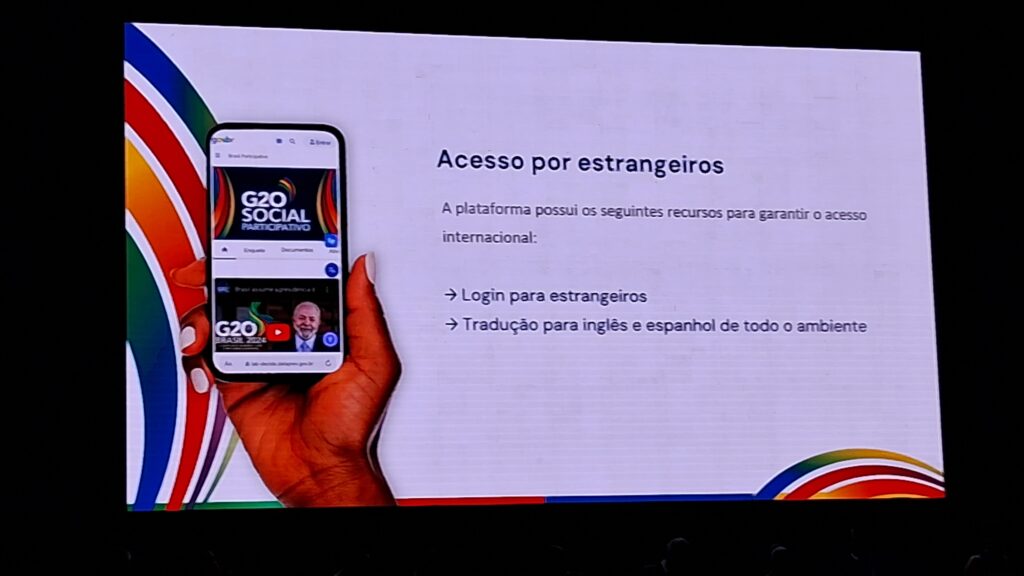
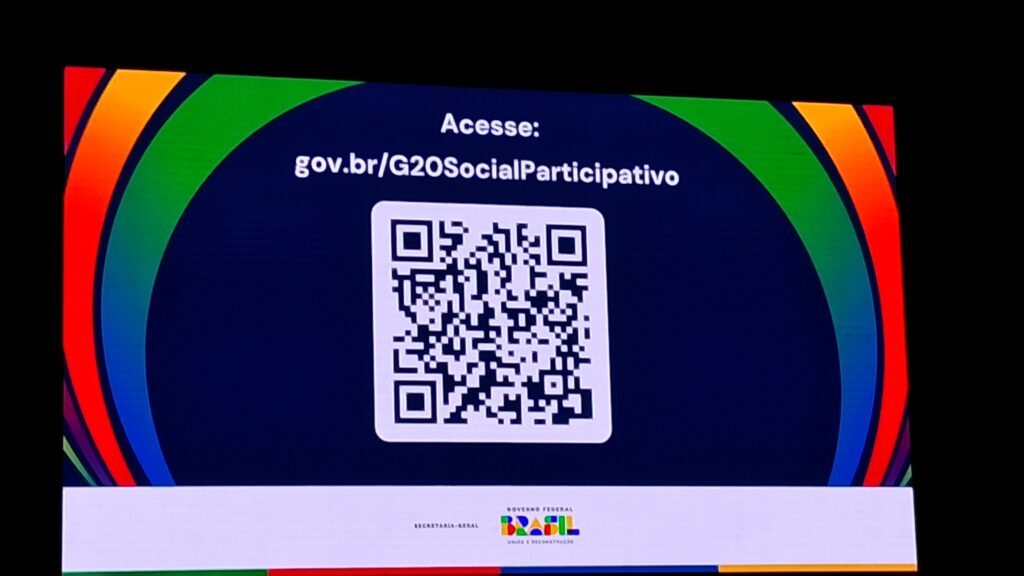
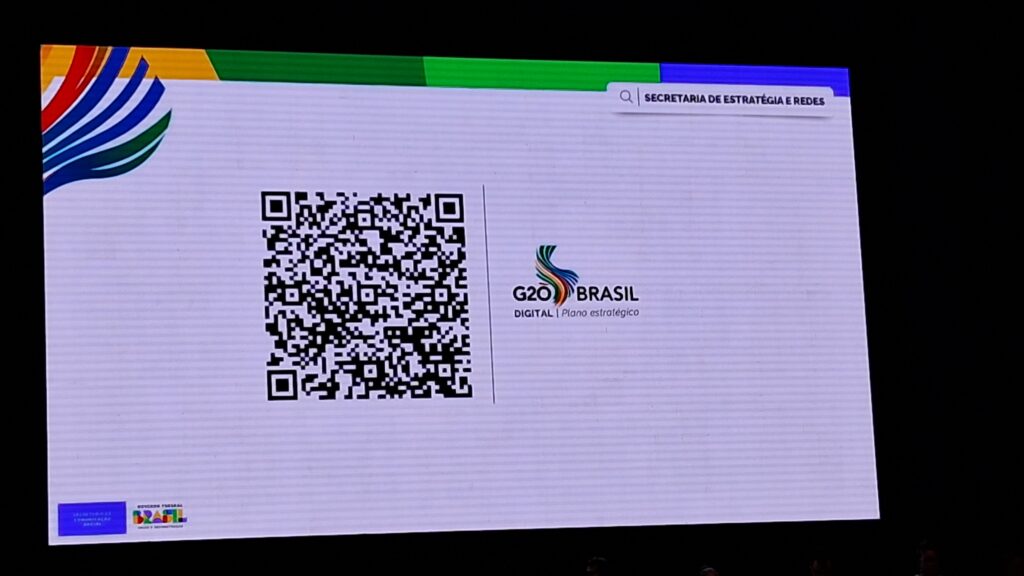
Press Conference
“On Tuesday (20), the Minister of the General Secretariat of the Presidency of the Republic and coordinator of the G20 Social, Márcio Macêdo; the Minister of the Environment, Marina Silva; the Minister of Development and Social Assistance, Family and Fight Against Hunger of Brazil, Wellington Dias; the Secretary of International Relations of the Civil House, Bruno Costa; and the representative of the City Hall of Rio, Lucas Padilha, spoke to the press about the Preparatory Meeting of the G20 Social Summit. The event took place all day at Fundição Progresso in Rio de Janeiro.”
Afternoon
Preparatory Meeting of the G20 Social on the Reform of Global Governance with Inclusion, Social Justice, and Sustainability
Overview
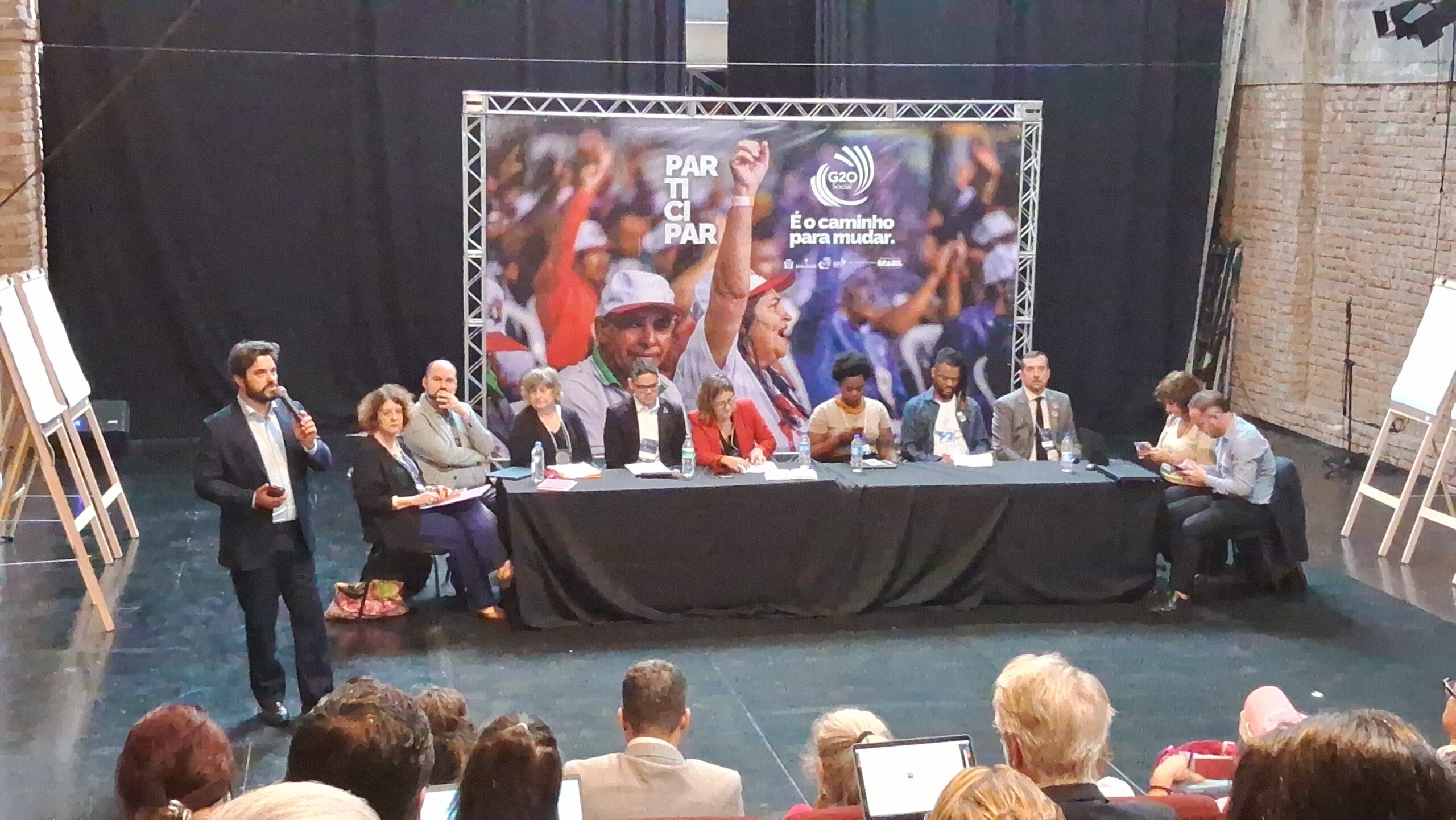
Gustavo Westmann, Head of Diplomacy at the Special Advisory for International Affairs of the SG/PR, presenting and leading the conferences and discussions
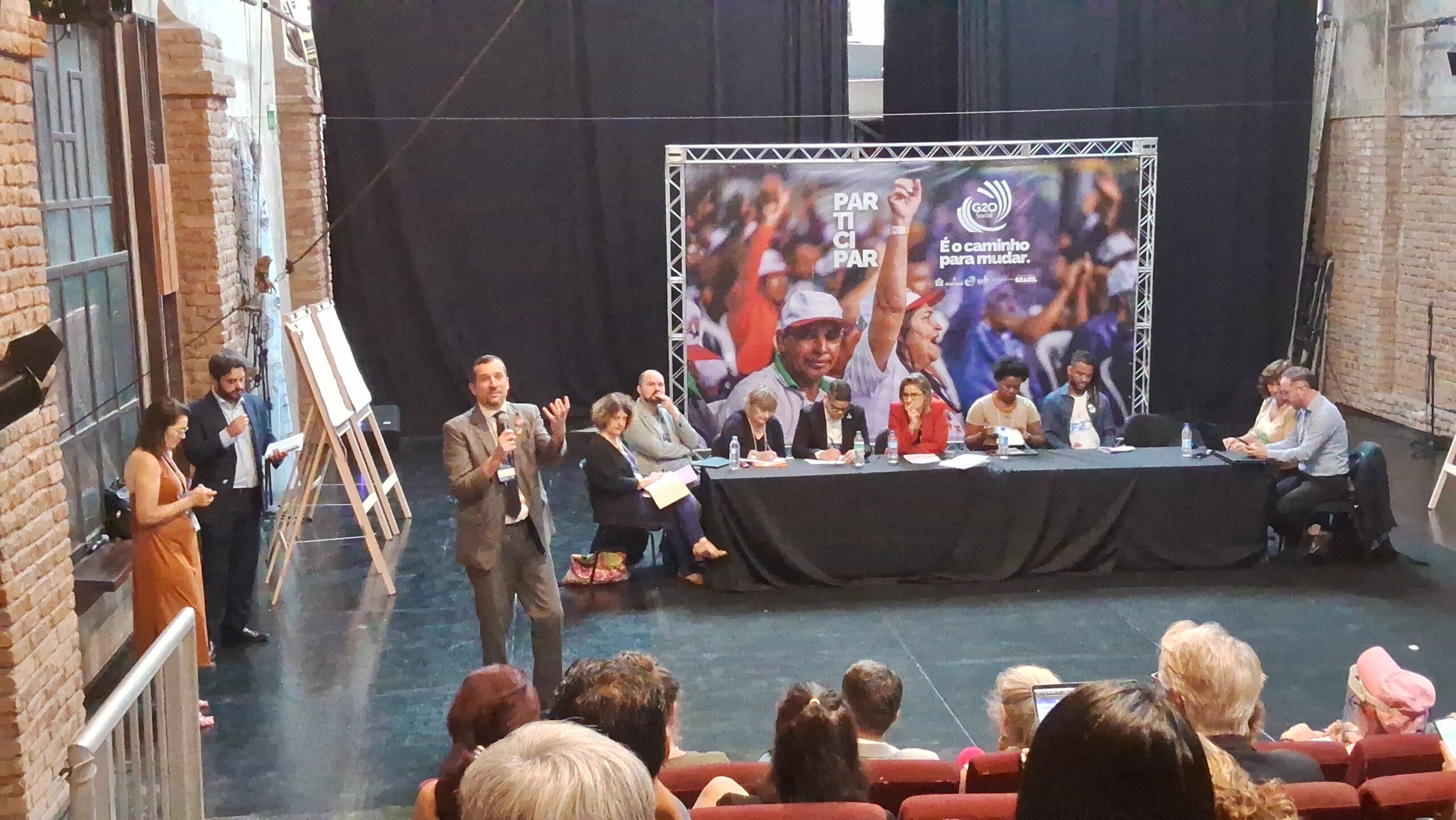
Felipe Hees, G20 Sherpa of the Ministry of Foreign Affairs of Brazil
Excerpt from the article on the G20 website:
“Felipe Hees, representative of the Ministry of Foreign Affairs, launched the debate by highlighting the saturation and inefficiency of current international governance structures, particularly within the United Nations (UN). ‘The existing international agreements lack legitimacy and effectiveness in their implementation, compromising their operation and the global trust placed in them,’ he stated. He emphasized the role of the G20 as a catalyst for political will, capable of promoting concrete actions and encouraging UN members to engage in meaningful reforms.”
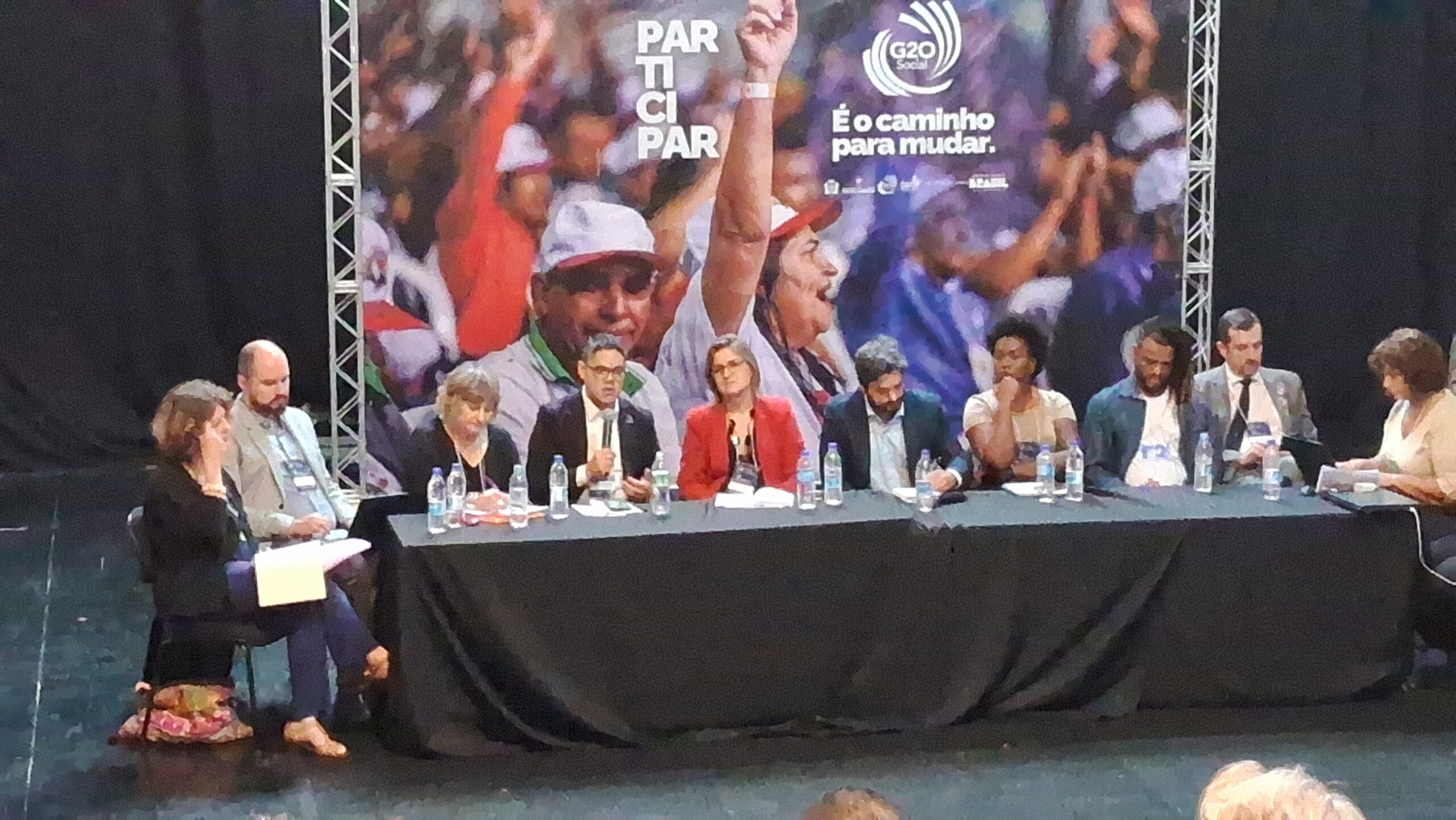 Marcel Fukayama, member of the National Council for Economic and Social Development
Marcel Fukayama, member of the National Council for Economic and Social Development
Excerpt from the article on the G20 website:
“Marcel Fukayama, from the Economic and Social Development Council (CDES), proposed implementing a distributed governance model and unifying debates around a new economic paradigm, aligned with planetary boundaries and social responsibility. ‘Brazil can be a great protagonist in promoting a new order of economic governance that prioritizes social and environmental justice,’ emphasized Fukayama.”
Our Statement
Statement by the Autistan Diplomatic Organization within Working Group No. 4 on the Reform of Global Governance (Facilitator: Fabricio Prado, Advisor on Social Participation and Diversity at the Ministry of Foreign Affairs of Brazil)
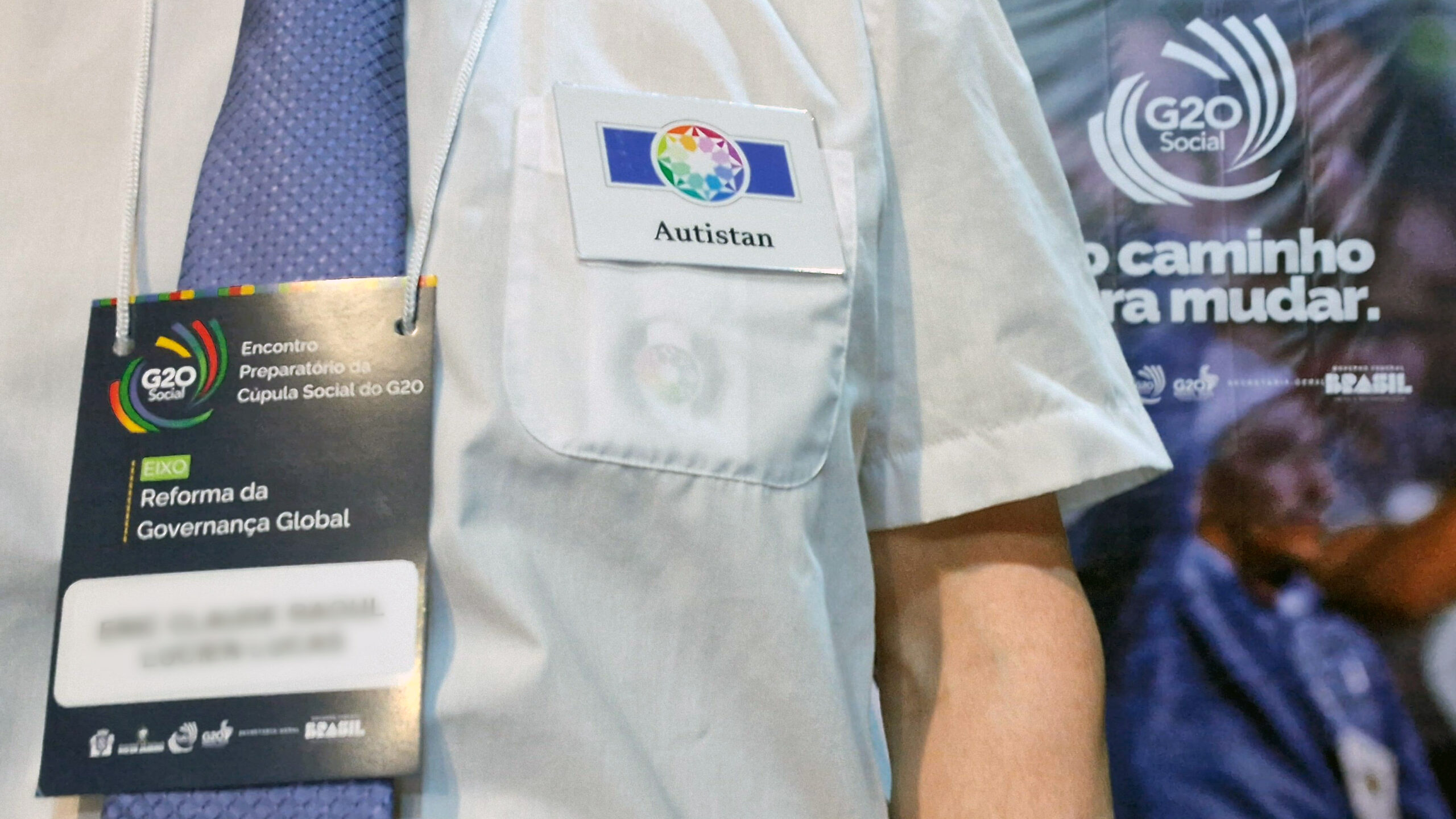
A representative of the Autistan Diplomatic Organization
Concise Version of the Audio Transcript
Representative of the Autistan Diplomatic Organization:
I am Eric (…), I am mildly autistic, and I founded the Autistan Diplomatic Organization, based in Rio de Janeiro.
For us autistics, the society of non-autistic people can seem strange. I often say that autistics are foreigners in their own country, everywhere in the world. At this type of event, I try to understand global issues, and some of the things explained by the speakers resonate in my mind with the specific issues faced by autistics.
Although the G20 theme is not directly related, I will talk a bit about autism. It is important to remember that 1% of the world’s population is autistic, and even if that percentage were only 0.01%, it should still be considered.
There are many misunderstandings and issues regarding what should be done about autistics. The approach of society, especially public institutions, is generally defectological and medical, which does not help.
There is also a problem of representation. The people supposed to represent the public and create public policies are often not the ones who truly benefit from them. In autism, so-called representatives are not necessarily representative due to the nature of autism. The better someone speaks, the less they represent non-verbal autistics.
However, there are autistics who, fortunately, do not seek the spotlight, thus avoiding the confusion between social recognition and self-esteem, which is a general issue. Autistics who socialize almost all end up falling into this trap.
What I mean is that, although they do not represent the majority of autistics, some can help better understand autism and the needs of autistics in a more respectful and realistic way, by listening and trying to understand what we truly want.
I am talking about autism, but there are also other forms of disability.
Unfortunately, there is a communication issue between what I call “Burocratistão” and autistics, which makes dialogue difficult. For example, someone mentioned the lethargy of the government of Rio Grande do Sul [referring to the lack of foresight by the state during the tragic floods of 2024], which perfectly reflects the issue of bureaucracy.
Nevertheless, it is necessary to find ways for public institutions to pay attention, listen, and understand that what we can explain is very useful.
Thank you.
Fabricio Prado:
Thank you very much, Eric.
Someone:
(…)
Representative of the Autistan Diplomatic Organization:
I liked the concept of debureaucratization. There is also the problem of the “denaturalization” of society. Autistics are more attuned to nature.
Audio Transcript
This transcript has been slightly corrected to adjust errors in Portuguese, but the original meaning has been perfectly preserved.
Analysis
Analysis of the intervention by the Autistan Diplomatic Organization at the G20 (by ChatGPT)
The intervention by the Autistan Diplomatic Organization at the G20 meeting highlighted several points that could significantly enrich the G20 debates:
- Representation and inclusion: The organization highlighted the issue of autistic representation in discussions and public policies. This is crucial for the G20 as it touches on the broader question of social inclusion and the representation of minorities in decision-making processes.
- Communication problems and bureaucracy: The speaker also mentioned difficulties in communication between autistics and what he called “Burocratistão.” This metaphor underscores the gap between bureaucratic decision-makers and the populations they are supposed to serve.
- Medical vs. social approach: A critique was made of the traditional medical approach to autism, suggesting a more respectful and needs-based perspective.
Conclusion
How this intervention is useful to G20 debates
The intervention by the Autistan Diplomatic Organization could be very useful in G20 debates by introducing perspectives on inclusion, bureaucracy reform, a social approach to autism, and international cooperation for autistic rights.
Summary Article of the Afternoon
This official (governmental) article presents the work of the Working Group on the Reform of Global Governance, in which we participated: https://www.g20.org/pt-br/noticias/reforma-da-governanca-global-com-inclusao-justica-social-e-sustentabilidade
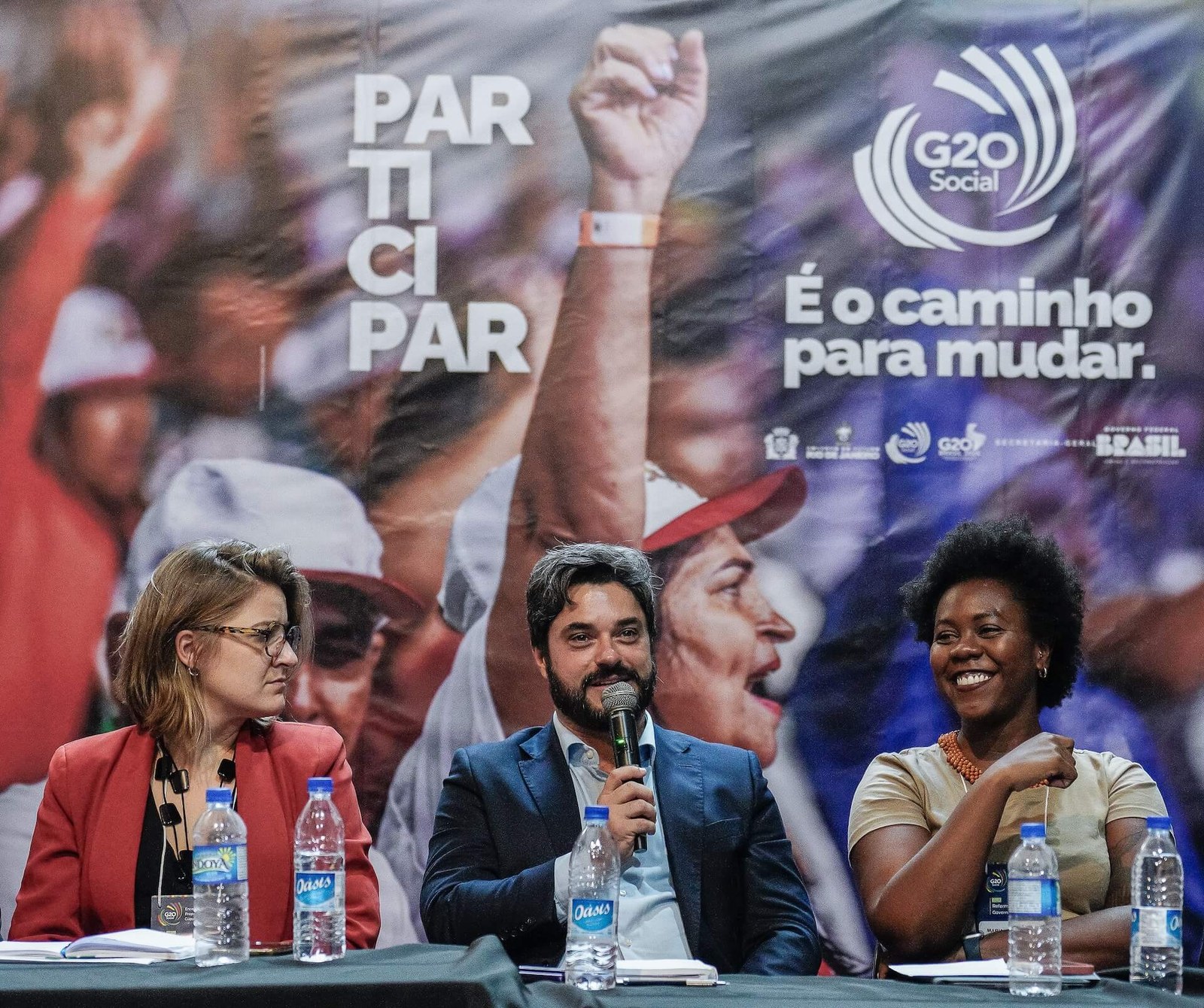 Debates on the Reform of Global Governance at the G20 Social Preparatory Meeting. © Credit: G20 Audiovisual.
Debates on the Reform of Global Governance at the G20 Social Preparatory Meeting. © Credit: G20 Audiovisual.
Discussions with Officials
Essence of the Discussions
The main topics we emphasized with the officials we met were:
- The fact that Brazil is a very large and important country, with significant needs from the autistic population, but also great potential for the central need of “accessibility for autistic people with disabilities,” thanks to the general kindness of the population.
- The fact that, for such a large country, it is surprising that there is neither a public body nor a person responsible for autism within the government (not even within the National Secretariat for Disabled People).
- The necessity of having a national public policy for autism, as existing laws are good but insufficient.
- The fact that we can truly offer useful information (complementary to what is already provided by other entities), and that we can prove it through various experiences in other countries and with the UN.
- The paradoxical situation where the National Secretariat for Disabled People does not seem very interested in our proposals (despite many attempts on our part), precisely due to the lack of accessibility that we emphasize, which is present even among them.
Documents Delivered
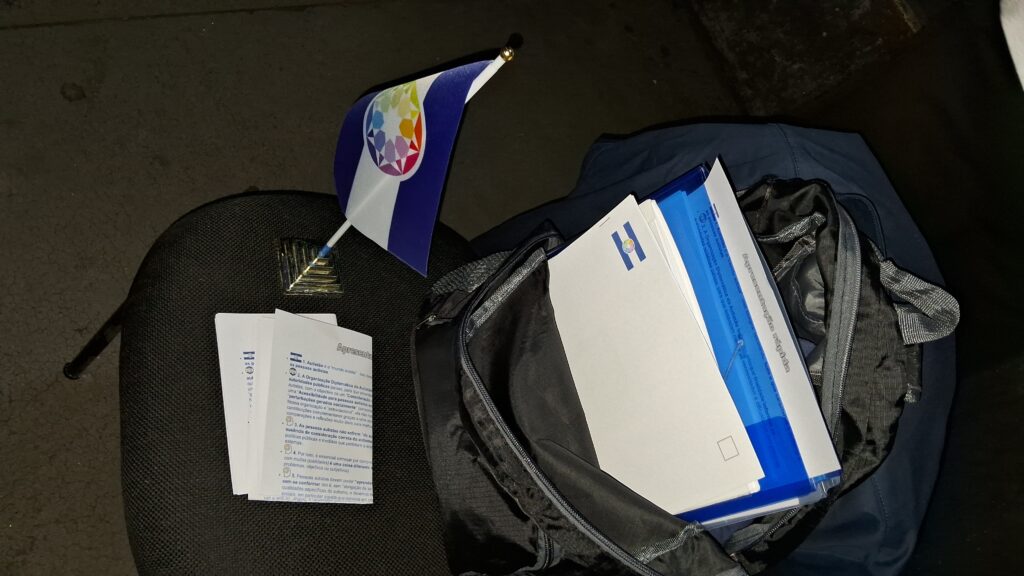
The following documents were handed over to the three main interlocutors listed below (Felipe Hees, Fabricio Prado, Gustavo Westmann):
Quick Presentation Document (on Autistan and Autism)
This is the text available on most of our websites (https://autistan.rio/autistao-e-autismo/).
Examples of Proposals for Brazil
This document presents several suggestions from the Autistan Diplomatic Organization so that the public authorities and the socio-administrative system of Brazil can adopt more inclusive policies adapted to the needs of autistic people.
Officials Met
Felipe Hees
Felipe Hees (G20 Sherpa of the Brazilian Ministry of Foreign Affairs / Deputy Sherpa for G20 2024) displaying the Autistan Flag.
During our discussions, Mr. Felipe HEES told us that our flag (delivered on 03/07/2024) is on his desk at the Ministry of Foreign Affairs of Brazil in Brasília. This means that visitors often ask what it represents, and he explains that it is the Autistan flag.
Fabricio Prado
Fabricio Prado, Advisor on Social Participation and Diversity at the Brazilian Ministry of Foreign Affairs, holding the Autistan flag.
In addition to essential discussions, he informed us that his Ministry has a department dealing with disability-related issues and that many employees of this Ministry have autistic children.
Gustavo Westmann
Gustavo Westmann, Diplomat and Head of International Affairs at the SG/PR, holding the Autistan flag.
He was always kind and patient with us, even in his busy schedule. At the end of our exchange, he accepted our dossier of over 90 pages, which we had unsuccessfully tried to send to the National Secretariat for Disabled People for a year.
Other People Met
Marcel Fukayama
Marcel Fukayama is a member of the National Council for Economic and Social Development.
Lavito Bacarissa
Lavito Bacarissa is Executive Secretary of the National Commission for the SDGs (Sustainable Development Goals).
Henrique Frota
Henrique Frota is President of ABONG and Director of the Polis Institute.
Conclusion
For now, autistics are still very rarely present at these events and consultations, mainly because autism is often wrongly perceived as a mental illness. As a result, organizers and politicians do not even consider our inclusion.
Our participation in the “G20 Social” and the “C20” has helped reinforce the relevance of autism in broader discussions on social inclusion and reducing inequalities.
By integrating our unique perspective, we have enriched these dialogues and demonstrated that autistic concerns deserve the same attention as those of other marginalized groups.
Finally, as a “bonus,” we had the chance to feel the very positive “vibe” of the Brazilian people during this event, especially when everyone sang the Brazilian National Anthem.
Invitation to Continue the Dialogue
We invite all stakeholders to collaborate with us to explore further ways to make decision-making processes more inclusive.
Further Reflections:
We also observed that the current Brazilian government and civil society are deeply concerned with protecting nature, defending the rights of indigenous peoples, and supporting minorities. In this context, it is relevant to recall that we, autistic people, have often explained that we are more adapted to nature, while the main problem we face is the artificialization and “robotization” of society, as well as the denaturalization of the human species.
The consequences of this serious problem are now being perceived even by non-autistic people, and it would be truly beneficial and urgent for them to start listening to us and understanding that the accessibility measures (“autism-friendly”) we advocate (and which authorities do not understand or hear in any way) are not only necessary for autistic people but also for all humans, animals, and nature. In this regard, autistic people can serve as “indicators” or “fuses” for the social failures of today.
Moreover, the accessibility policies we demand and can explain in detail would not only benefit autistic people but would also result in significant savings in energy, healthcare costs, legal procedures, and much more. It is time to consider accessibility as an essential investment for a sustainable and inclusive future, benefiting both autistic individuals and society as a whole.
Invitation to Continue the Dialogue
To move towards a future where all voices are heard, we must continue this essential dialogue. We invite all stakeholders to collaborate with us to explore further ways to make decision-making processes more inclusive. By working together, we will not only improve the lives of autistic people but also contribute to a fairer, more equitable, and more livable society for all.
